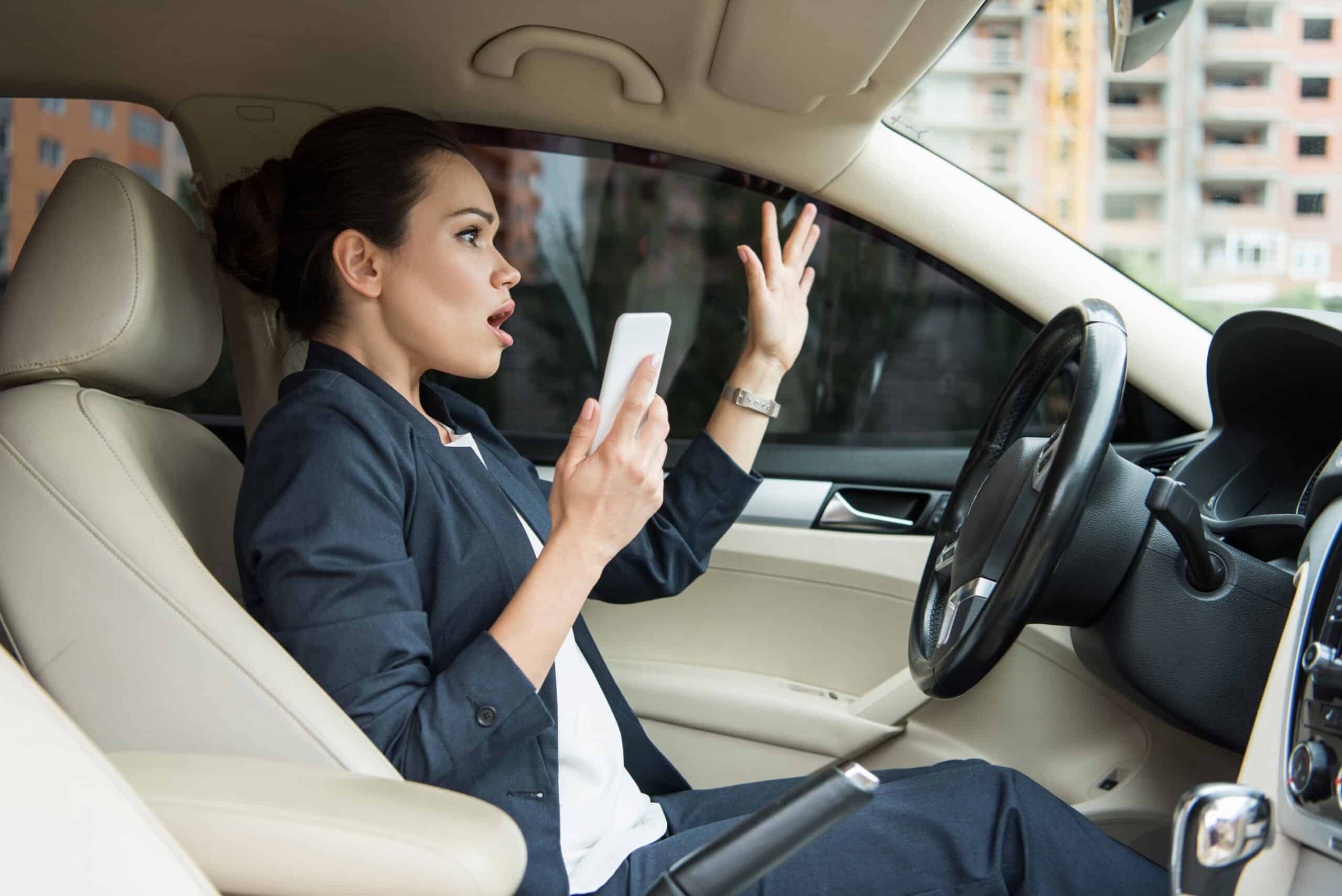
Proving Distracted Driving in Georgia: Legal Challenges and Evidence Collection
As defined by the National Highway Traffic Safety Administration (NHTSA), distracted driving is any activity that diverts a driver’s attention from driving. It may involve texting, talking on the phone, eating, drinking, conversing with passengers, adjusting the stereo, applying makeup, or anything that takes the driver’s attention away from safely operating the vehicle. Texting is a particularly alarming form of driver distraction, as it requires visual, manual, and cognitive attention. NHTSA reports that sending or reading a text takes your eyes off the road for five seconds, equivalent to driving the length of a football field with your eyes closed. In the U.S., in a recent year, 3,142 people lost their lives in motor vehicle crashes involving distracted drivers.
What Is Distracted Driving and What Makes It So Dangerous?
Distracted driving is any activity that may divert the driver’s attention away from driving. These are broken down into three types: manual, visual, and cognitive.
Manual Distraction
This is when you physically move one or both hands from the wheel. A common reason for this is if someone is eating or drinking. You could also be smoking cigarettes or even just adjusting the car mirrors.
Visual Distraction
This is when your eyes wander off the road. An example would be if you are trying to read directions while you drive. Also common is if you are changing your radio station or adjusting your temperature gauges.
Cognitive Distraction
This is when your mind emotionally drifts or wanders from the road. An example would be if you are talking to another passenger or thinking about something that upsets you. Another example is if you are under the influence of a substance.
On a national level, there are more than 1,000 vehicle accident injuries each day due to distracted driving. Many states are taking measures to prevent distracted driving accidents, and Georgia is no exception.
Distracted Driving Statistics and Facts
Thousands of lives are tragically lost in fatal crashes each year. According to Injury Facts® 2014, the National Safety Council’s annual report on unintentional injuries, the three biggest causes of fatalities on the road include the following:
- alcohol (30.8 percent),
- speeding (30 percent), and
- distracted driving (26 percent).
The reality that all of these top causes are avoidable should grab our attention. But while it may not come as a surprise to you that distracted driving is close to equal with drunk driving and excessive speed when it comes to fatal car crashes, you just might be surprised to learn what falls under the category of distracted driving.
Many distractions are out there, but cell phone use has recently been ranked as the number one distraction. Let’s consider the following statistics:
- In 2010, an estimated 160,000 crashes involved texting or e-mailing with a handheld device.
- Interestingly, the NSC also reported that by 2011, there were more cell phone subscriptions than people in the United States!
- According to the National Highway Traffic Safety Administration (NHTSA), sending or receiving a text message takes a driver’s eyes off the road for almost five seconds.
Thankfully, state laws have cracked down on texting while driving, and public awareness has made strides in educating that multi-tasking is really a myth; while our brains can quickly toggle between two tasks, we are simply unable to perform two tasks simultaneously. So, you’re probably thinking: That’s why I never text while driving, which is great; however, there are more statistics to consider. Studies now show that the activity in the area of the brain that processes moving images decreases by up to one third when merely listening on a phone. The following statistics from NSC.org should be of interest to all of us:
- Also during 2010, more than one million crashes involved just talking on a cell phone, which translates to one in every four crashes.
- At any given moment during daylight hours on the road, an estimated 660,000 drivers are using electronic devices while driving, according to the National Occupant Protection Use Survey (NOPUS).
- Findings from a recent NSC public opinion poll show that 80 percent of drivers across the United States wrongly believe that hands-free devices are safer than using a handheld phone.
- Nonetheless, the reaction time with a hands-free device is slower than the reaction time of driver impaired at a .08 alcohol intoxication concentration.
According to the NSC, “distracted drivers using hands-free devices suffer from inattention blindness, delayed response and reaction times, and problems staying in their lane.” Inattention blindness is when drivers who use hands-free devices “fail to see up to 50 percent of the information in their driving environment.” An AAA study revealed how the use of Siri is more distracting than speaking to a live passenger in the vehicle because a live person is another set of eyes with the ability to point out hazards or stop talking when driving conditions become challenging.
Therefore, before you get behind the wheel of your vehicle, not only remember how important it is to drive sober and to follow speed limits, but also consider how you should minimize your distractions for the sake of everyone on the roads. You are one of more than 275 million cell phone subscribers with 81 percent admitting to talking on the cell phone while driving. So, now you’re rationalizing: This is the twenty-first century; everybody does it! But are you old enough to remember 1996 when only 14 percent of us had cell phones? We survived . . . and planned ahead!
And before you think that saving time is saving money, consider one final statistic: According to Injury Facts, the average economic cost due to a crash was more than $1 million per death and more than $78,000 per nonfatal disabling injury. Likely, we can afford to turn off our cell phones and hands-free devices during commutes.
What Is the Law Against Distracted Driving in Georgia?
The Hands-Free Georgia Act went into effect on July 1, 2018. As stated by the Georgia Governor’s Office of Highway Safety, drivers are prohibited under the act from:
- Having a phone in their hands or touching any part of the body while driving
- Reading, writing, or sending text messages, emails, social media content, or other internet data while on the road, even with hands-free technology (voice-to-text is allowed)
- Watching videos behind the wheel of a vehicle (navigational/GPS videos are allowed)
- Using smartphones or electronic devices to record videos on the road (continuously running dash cams are allowed)
Drivers are allowed to listen to streaming music while driving, provided it does not include videos, but they are not allowed to touch their phones to activate or program any music streaming app, which must be done before getting on the road. Penalties for violations of the Hands-Free Georgia Act include:
- First conviction: $50 and 1 point assessed against the driver’s license
- Second conviction: $100 and 2 points
- Third or subsequent convictions: $150 and 3 points
How Can You Recover Compensation When a Distracted Driver Causes a Crash?
Distracted driving is extremely dangerous but, unfortunately, typical behavior today. If you have been hit by a distracted driver, it is in your best interests to speak with an experienced Georgia car accident lawyer right away. The burden of proof is on you to show that the driver who hit you was distracted. Your attorney can investigate your accident and gather evidence to support your claim. The types of evidence that may be used to prove distracted driving include:
- Admission of guilt: In many cases, after an accident, the at-fault driver will apologize and offer an explanation of how the crash occurred, for example, “I was checking my phone to see who was calling,” or “I was dealing with my screaming toddler in the back seat.” This type of admission will be included in the police report if made in the presence of the police officer on the scene.
- Eyewitness testimony: An eyewitness may have seen the at-fault driver texting, talking on a cell phone, or engaging in some other form of driver distraction. Testimony of one or more such witnesses can be used to help prove distracted driving.
- Phone records: If the driver distraction involves a cell phone, your attorney can subpoena the cell phone records of the other driver. These records may be used to establish cell phone use at the time of the crash.
- Dashcam or other camera footage: Camera footage from a dashcam on your vehicle or another vehicle or footage from a surveillance camera at a nearby business may reveal the driver’s dangerous, distracted driving behavior.
Accidents caused by distracted driving have doubled in the past decade as mobile devices have become more and more numerous, especially among teenage drivers. The state of Georgia has recently created the Hands-Free Law in order to address this growing problem. But what happens if you are found to be at fault for a distracted driving accident? Our firm discusses how distracted driving can impact liability determination in car accidents and why working with an attorney may benefit your case.
Distracted Driving Accident, Insurance, and Personal Injury Claims
Suppose you are a victim of an accident caused by a distracted driver. In that case, you may be able to seek compensation for your damages by filing an insurance claim or initiating a personal injury lawsuit in court. If the distracted driver has auto insurance, you may file a claim with their auto insurance carrier to recover payment for your losses.
If the other driver did not have insurance or their insurance coverage was insufficient to pay for the full extent of your damages, you should speak to a car accident attorney to learn the best options for your case. You may be able to file an UIM (uninsured motorist claim) with your own insurance carrier if your policy provides UIM coverage. If that is not an option, your attorney may then recommend taking your case to court and filing a personal injury lawsuit against the at-fault driver.
What Happens If I Am at Fault for a Distracted Driving Accident?
If you were found to be at fault for a distracted driving accident, you may still be able to recover some compensation for your damages in some cases. The state of Georgia follows a modified comparative negligence rule which allows someone who was partially responsible for their own accident to recover damages compensation. However, that person may not be 50% at fault or more, or they may be barred from seeking damages. In addition, the amount the distracted driver may receive can be reduced in proportion to their percentage of fault.
In other words, if you were engaged in an activity that is considered distracted driving at the time of the accident, your percentage of fault can directly impact your ability to recover compensation. You will need to demonstrate that the other person was also negligent and also contributed to the accident in some capacity. For these reasons, working with a skilled car accident attorney is fundamental for your case.
How Do I Avoid Being Distracted Behind the Wheel?
Here are some tips on how to avoid distracted driving.
- Always keep your eyes on the road.
- Keep your phone out of your own reach.
- Don’t take any phone calls, hands-free or not.
- Don’t reach for any items.
- If you need to read directions, pull over.
- Adjust your mirrors before driving
- Stay focused on the road.
How Do I Win a Distracted Driving Personal Injury Lawsuit?
In Georgia, there are a couple of things you have to prove in order to win a personal injury lawsuit against a distracted driver.
You, as the plaintiff, must prove the following:
- The distracted driver owed you a duty;
- The distracted driver breached the duty owed, and
- The distracted driver’s actions caused your injuries
To explain this further, a driver in Georgia owes a duty to all other people to drive reasonably in any given circumstance. If a driver becomes distracted and causes an accident, then that duty is breached. This makes the distracted driver liable for the injuries.
If won, your personal injury lawsuit will take care of lost wages, hospital bills, pain and suffering, damage to vehicles, etc. The bottom line is that a distracted driver is a dangerous driver and potentially a negligent driver.
If you have been injured in a vehicle accident by a distracted driver, you must call a qualified personal injury attorney and discuss your options. You may be eligible for compensation and a lawyer will see to it your rights are protected.
Why Choose The Scott Pryor Law Group for a Distracted Driving Car Accident in Georgia?
The attorney you choose to represent you can make all the difference in the outcome of your case. At The Scott Pryor Law Group, we have devoted our practice to helping injured people recover the compensation they deserve. Founding attorney Scott Pryor has been listed among Georgia Super Lawyers®, awarded membership in the Multi-Million Dollar Advocates Forum, and named among the top 1% of trial lawyers nationwide. Call us at (470) 516-8130 if you have been injured in a crash caused by a distracted driver.











